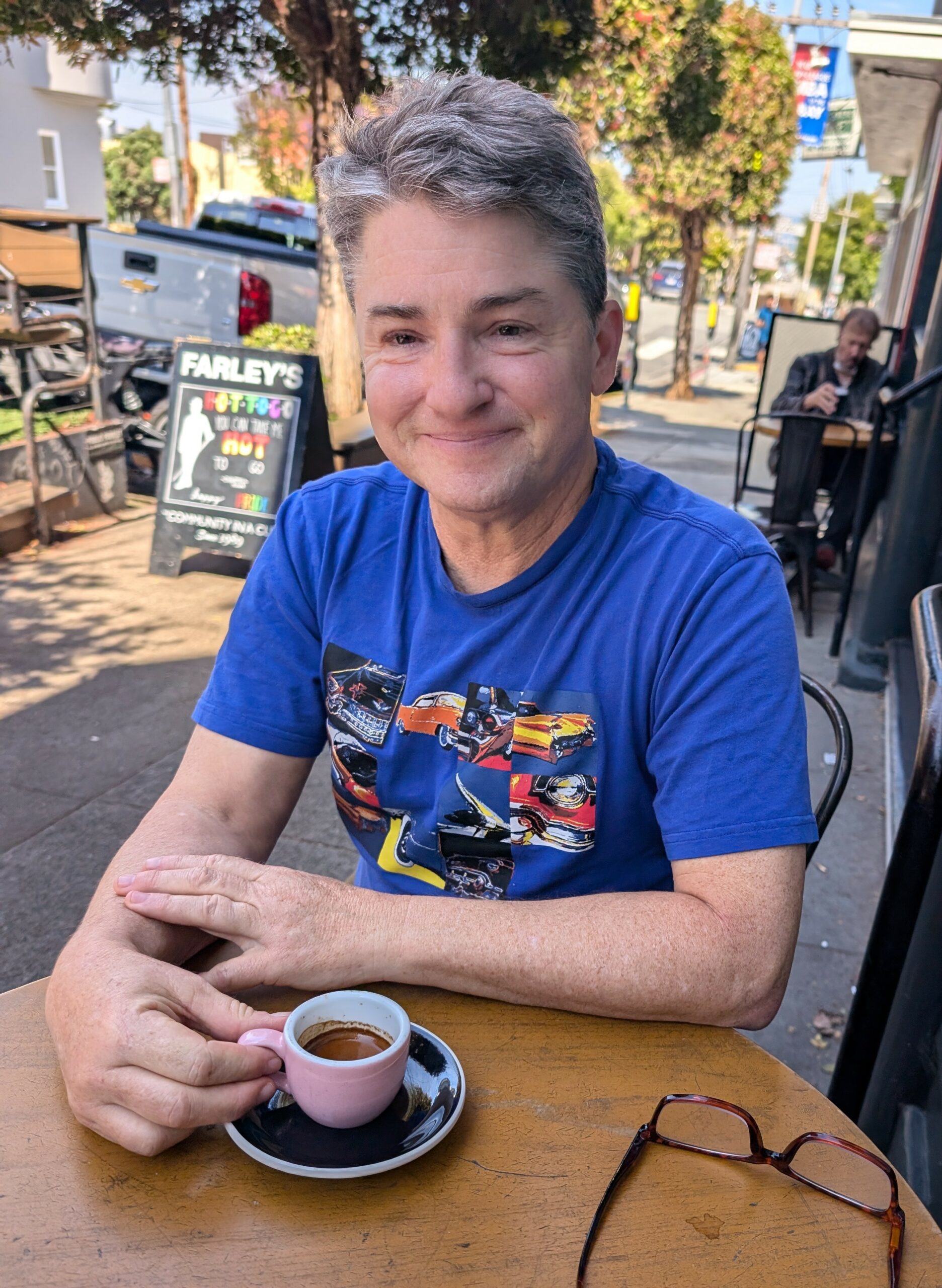The Evidence of the Garden
My ex-husband died in my living room a month before the world shut down.
Two months later, I met Karen. Within an hour of our meeting, I knew we would be married. Ten months later, in the spring, they moved in.
Before moving in, Karen expressed concern about coming into the home that contained so much of my past relationship. I expressed my belief that there were not so many memories, and that those that existed happened “a long time ago.” We thereby both found out that my language was imprecise. My memory was not what I thought it was. Karen could remember precisely the words I had used in conversations we had months before. I would remember the gist of what I had been trying to get across, and often I would misremember even that. I also found that my memory was malleable, untrustworthy. It was shaped by my obsessions, my desires and my restless ever-narrating mind. To me, “a long time ago” meant that so much had transpired since then that those memories lived in another world, a lost civilization. My mind had also changed facts; what I believed had been five or seven years turned out to be two, conveniently fitting my sense of the thing. Karen moved in anyway, despite me, because of me.
Two weeks before Karen moved in, grief arrived and wouldn’t leave. There was no picture or words to go with the pain. It just was. I wrote, I prayed, I called friends. The pain distorted my thinking to where I began to doubt Karen’s love. A friend suggested that I had once experienced some kind of trauma, perhaps regarding abandonment or neglect. As a result, my mind’s tendency would be to seek evidence of the trauma I was used to. The problem with this was: what we look for we tend to find. My friend suggested that I look instead for evidence of whatever was the opposite of the trauma I had experienced.
I was unable to name the hole in my heart or to name any specific trauma. I nevertheless set out on a quest for evidence that Karen loved me. I immediately began to find it. A text arrived, unexpected and sweet. I regarded Karen’s arm wrapped around my head in the middle of the night, when I knew they preferred to sleep un-touching. I added to my inventory the way that Karen whispered the Modeh Ani into my ear every morning.
My quest taught me that I had not been paying attention. I expected words, which I did not always get. But I have learned over the years to listen to beings without words. I learned to observe my dogs, how a flick of an ear could signify stress or a hard stare could indicate a readiness to brawl. A plant could express itself with new growth. Maybe Karen would not always say the words, but that did not mean that Karen was entirely unknowable. Maybe it would take another type of listening.
When my ex-husband died, the front yard was shrouded in Bermuda grass, bordered by large rocks and a few plants I had managed not to kill. I had always wanted to tear out the lawn and put in a pollinator garden but never had the money or time. Karen had a similar idea, but made it happen in less than a month. When Karen arrived, I mentioned the UC Davis Arboretum plant sale. We ordered online and picked up plants. Karen brought some plants from their past life. I had some of my own from before. Within two weeks of Karen’s arrival, Karen hired two young queers to tear out the lawn. They turned in compost, covering the dirt with cardboard to kill the grass and put down mulch that was created from a camphor tree we had removed. We went to the neighborhood nursery and bought more plants. We put them in the dirt. We were dirty, sunburned and exhausted.
I sometimes felt better, as I compiled the list of evidence. Sometimes the grief came at me again, smirking. I wrote pages about the grief, set my feet apart and settled in for a slog.
Our morning routine evolved. Karen would whisper the Modeh Ani, and I would say my morning prayers to myself as I made coffee. I would bring Karen citrus water, vitamins, coffee and breakfast and we’d sometimes have our breakfast in bed. Then we’d tour the garden.
I knew Karen had invested hours into a garden during a previous relationship, and the garden was lost in the breakup. I heard more about the loss of the garden than I did of the loss of the ex. Sometimes my melancholy mind would wonder whether I was just mechanism to support Karen’s garden. There could be worse things. I pondered the meaning of the garden. Was this Karen’s attempt to salvage something lost in its basest sense, without any conscious thought? Was it an intentional effort to carry something away from failure that could be used to support and beautify this new endeavor? Was it just Karen’s dogged stubbornness to try again and again despite the obvious risks? Did Karen just really like to garden, and there was no other meaning?
Whatever the meaning of the garden, I saw that Karen was thoroughly committed. Karen had held back nothing, had not waited to see if it would work between us. Karen didn’t plant one or two little plants from the corner drugstore to see what happened. All of Karen’s sense of order, of beauty, of care was channeled into that square of dirt and Bermuda grass.
I watched Karen trying to dig a root out of the ground as I sat there on my haunches with the reciprocating saw. I said, “I see I have met my match in stubbornness.” Karen was determination and hard work. Karen missed no detail. The evidence of the garden was that Karen was as fearless about this love as I was, and backed up that heart with discipline, care, effort and joy.
The plants Karen brought from their previous life rooted and thrived, the espaliered lemon extravagantly blooming and setting fruit, the struggling lantana darkening and sending up new leaves. My transplants from my past went into severe shock after being violently uprooted from where they had struggled for years. And yet, some lived.
Although I called it Karen’s garden, I saw myself reflected there too. I dug roots and I planted, moved rocks and loaded compost bins. I had suggested a rose, remembering how I had asked my dad to buy me some when I was 14; Karen saw to it that we bought three. We found some orange daisy things, an orange bougainvillea and cuffia. I suddenly liked orange. Karen found an orange rose in her friend’s garden and texted me a picture. We decided to add the orange rose. Karen bought white salvia on impulse; I decided I liked white salvia. I petitioned for a strange, tropical-looking oddity that we put in a pot. They called it the “giant leopard plant.” I requested another hellebore and some sea thrift with cute popcorn ball flowers, and I got them.
The new plants grew with an outrageous vigor that astounded me, flax and salvia blooming before the roots had even taken hold. Forget-me-nots expanded and curled around a pot where once had lain a tangle of jasmine and lantana. Karen pruned the flannel bush that I had planted years ago and it exploded into hundreds of huge yellow blossoms. We stood and watched it being circled by hectic bees; Karen told me these were carpenter bees. Hummingbirds took over the yard and fought the jays and crows. Wild ducks moved in and ate my precious poppies. Somehow this glorious, expressionistic, wildly ordered garden was both of us. Even if it was Karen’s garden, it pleased Karen to incorporate me. And that too, was evidence.
Before I met Karen, I had planted a wild fuchsia, the kind that was supposed to run a bit ragged. It had done reasonably well in the side yard. I sheared it back to the ground after the blossoms were spent in August. But it liked to send out runners. Karen, like God to the waters, said, “Here and no farther.” Runners were pinched off. The fuchsia took to the discipline by throwing up thick tidy heaps of silvery foliage.
On a visit to have dinner with two of Karen’s friends, we spied a tree of devastating beauty in someone’s lawn. Karen researched it and found out it was an Arbutus “Marina,” a type of manzanita. I told Karen that our utility company gave away free trees. We found out that SMUD had that very tree in its inventory, and we went through the process of qualifying for one. The tree arrived, taller than either of us. Karen waited to plant it with me, after I insisted. We dug the hole together and I suggested a prayer, because if the tree thrives it means we are thriving. Karen said, “Go ahead.” I said a prayer. Karen eased the root ball out of the pot, saying, “Here is your new forever home.”
I took those words as evidence, not of the tree’s home but of Karen’s. I prayed silently, may my heart be Karen’s new home, forever and always.

Miles Whitney is a queer, trans, Jewish lawyer living in Sacramento, California. Miles started writing creatively after the unexpected death of his daughter Isabel in 2022.



